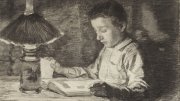In "How Longfellow Woke the Dead," Kemper professor of American History Jill Lepore (who also chairs the history and literature program) offers a serious reading of Henry Wadsworth Longfellow's "Paul Revere's Ride," rescuing it from the status of elementary-school recitation exercise and reinterpreting it as a fierce statement of his opposition to slavery. She does note that Longfellow got many of his facts wrong, and slighted Revere's co-rider, citing this parody from an 1896 Century Magazine:
'Tis all very well for the children to hear
Of the midnight ride of Paul Revere;
But why should my name be quite forgot,
Who rode as boldly and well, God wot?
Why should I ask? The reason is clear—
My name was Dawes and his Revere.
On this, the 150th anniversary of publication, however (it appeared in The Atlantic Monthly on the day South Carolina seceded from the Union), she puts the poem in its contemporary context, beginning in 1837, when Longfellow arrived at Harvard and met Charles Sumner, A.B. 1830, LL.B. 1834, LL.D. 1859, the fiery abolitionist who proved an influence, Lepore observes, on the "almost maddeningly restrained and genteel" Longfellow (and, as a bachelor, accompanied the author on his honeymoon).
In our archives, read more about Lepore's earlier work on colonial New York, in an historical novel, and other subjects.
The same spring 2011 issue of the American Scholar, which has something of a Civil War theme, features on its cover an excerpt from 1861: The Civil War Awakening, by Adam Goodheart '92, the subject of the lead book review in the current Harvard Magazine, by Michael T. Bernath, Ph.D. '05, Tebeau assistant professor at the University of Miami.








